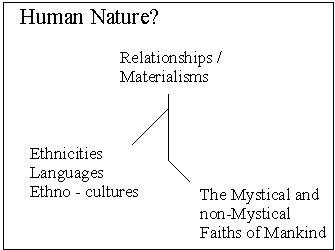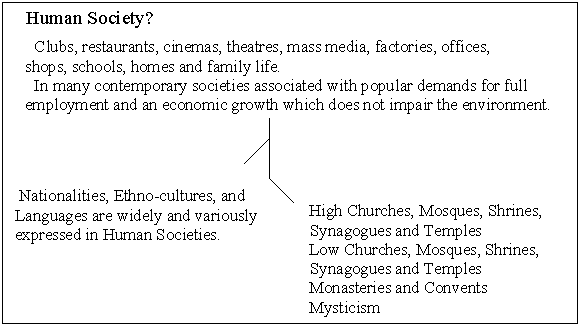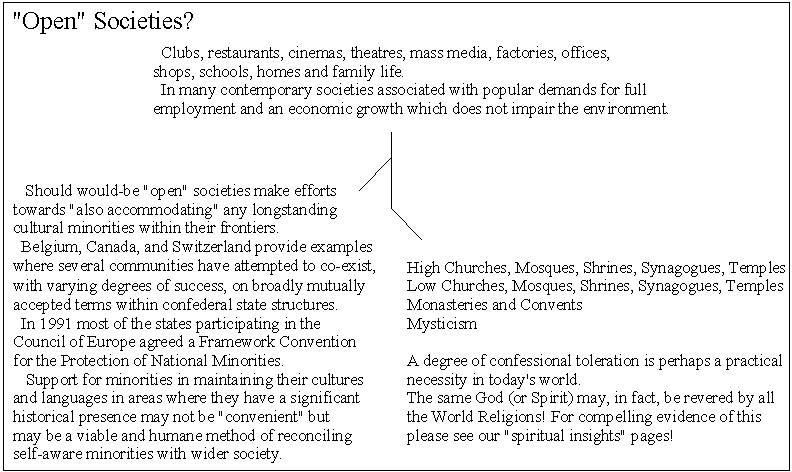Welcome
You might well be here in response to our advertising campaign suggesting that we have gone some way towards confirming Emerson's insightful notion that:-
"...man is a bundle of relations, a knot of roots,
whose flower and fruitage is the world..."
From this page we hope to demonstrate that it may well be that behavioural "roots" innate to Humanity give rise to Human Society!!!


In order to more fully explore the notion that the human? world bursts forth as "flower and fruitage" from human-innate "roots" it is necessary to venture a little into some interesting philosophical areas:-
"...Are all our actions alike performed by the one predominant faculty, or are there three faculties
operating
severally in our different actions? Do we learn with one internal faculty, and become angry with another,
and with a third
feel desire for all the pleasures connected with eating and drinking, and the propagation of the species;
or upon every impulse to
action, do we perform these several actions with the whole soul?"
(Plato - The Republic : Book 4)
Plato lived in Athens and was a contemporary of Socrates and of Aristotle both of whom he knew personally.
He is recognized as being one of the most enduringly influential
figures in the history of western philosophy. A well regarded twentieth century philosopher
even went so far as to suggest that -
The safest general characterization of the European
philosophical tradition is that it consists of a series of footnotes to Plato.
(A.N. Whitehead in his work Process and Reality)
Plato's most famous work is his "The Republic". It features
two highly relevant passages explicitly suggesting that human actions fall into three categories -
and that human beings have a "Tripartite Soul". Similar
suggestions are to be found in other of Plato's works.

At age-of-the-sage we have explored such ideas fairly extensively and have to admit that our
own researches do lead us to the conclusion that human nature is
basically "tripartite" along the lines suggested by Plato's insightful questions about our actions and our faculties.
Although the range of ideas that directly arise from a consideration of Emerson's quote about Man as being a "knot of roots" and Plato's
questions about the human "motivational" soul tend to be somewhat psychological we are confident that on fuller consideration
these ideas will be seen as having immense potential towards leading to a greater philosophical understanding
of the human condition.
Thoroughly convincing answers to questionings about "what people innately
are" and about
"what people are innately motivated to do" are important
forms of wisdom we should all be interested in attaining as they have the potential help us to
better understand our own lives, our own societies, and the world we live in.

Our site is rather large and to facilitate a structured introduction to our findings we recommend three routes:-
The Tripartite Soul |
|
| This is a review of how Pythagoras, Plato, Socrates, Shakespeare and such major World Religions as Christianity, Islam, Hinduism and Buddhism all hold the view that Human Spirituality is relative to "Desire" and to "Wrath" thus supporting the three-directioned representation of Human Nature and the suggested relationship between "Human Nature and Society" that are presented earlier on this page. | |
The Study of History |
|
|
"History is for human self-knowledge ... the only clue to what man can do is
what man has done. The value of history, then, is that it teaches us what man has done
and thus what man is."
R. G. Collingwood It may well be that one of the most unappreciated things that people do in history is to contribute to what might be called "the Construction of Social Reality":- | |
![[emerson, bundle of relations, knot of roots, quotation]](enlightenment.gif)
